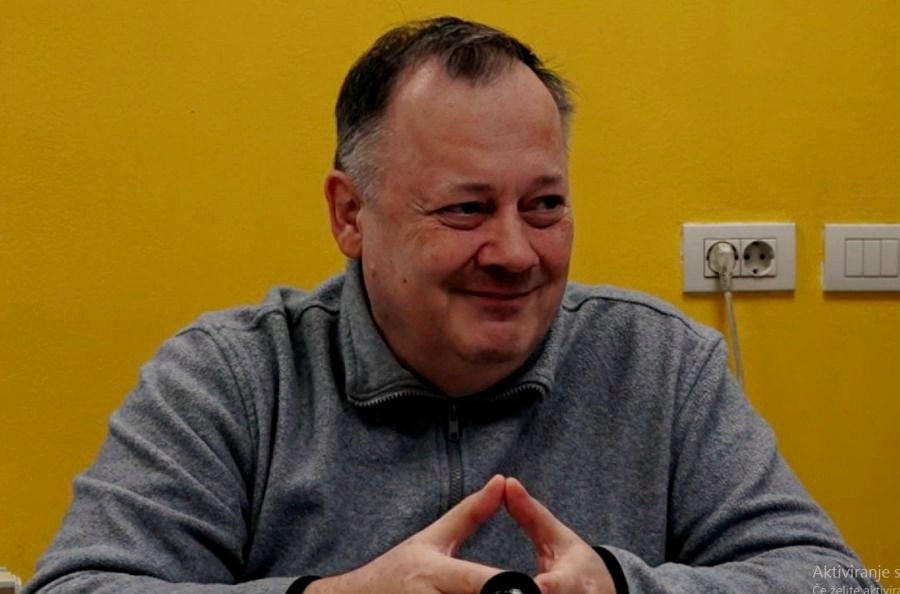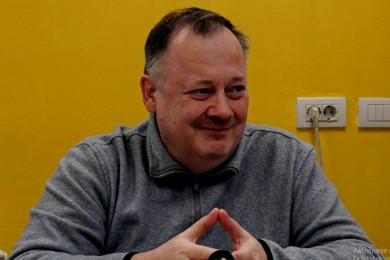Interview: Zoran Dernovšek - Raketka: »The time when we gained independence was a time of exhilaration, motivation and enthusiasm«
How do you remember that moment? Were there any dilemmas, second thoughts or fears?
Just before 6 pm, I got the order to engage in a combat operation. I simply couldn’t believe it was really happening. I grasped that this was no longer a joke. About 2.5 km from the Ig training centre, I spotted two MI8 helicopters carrying out transport and landing operations. It was clearly visible that they were armed with air-to-surface missiles. Both helicopters were fully armed. I later found out that a third helicopter was also on the way.
Why were they approaching Ig?
To unblock the tank units in Brnik. They were planning a missile and landing attack. The helicopters were transporting special forces from Niš, who were to unblock the units on the ground. As is usually the case with the air force, they had primary and secondary targets. The primary target was the tank unit in Brnik, but, as it was getting dark fast due to the bad weather, they decided to attack the secondary target, i.e. the Ig training centre located above the centre of Ig. It meant that, if the attack on the training centre had gone through, half of the town would have been under attack. The colonel on duty in at the Pleso airport ordered the attack on the secondary target. Professional career soldiers therefore received the order and confirmed it. In practice, that meant that they would also carry it out. We had no need to be under any illusion about the possibility of them not going through with it.
How did you respond to the combat engagement order?
I aimed the Strela 2M missile at the leader of the squadron and, after it had flown over the last houses in Ig, I launched the missile. Its flight was quite unusual, very low. I beat the helicopter by 5 to 7 seconds before it would have launched its missiles. If I hadn’t, its missiles would have flown in our direction. I am often told that it was nothing extraordinary. That I just fired a missile. But we forget that the Territorial Defence troops were forced into the war from our lives as civilians. We were not trained psychopaths and killers. None of us showed up to kill people. We all hoped that there would be no war at all. I can say that each and every one of us hoped that things would not go as far as they did. It was crystal clear to me that, if I launched that missile, I might kill somebody. When I was making my decision to launch the missile, I was shaking like a leaf. I had to decide, but I could have decided to do anything. Once I finally took my decision to launch the missile, the situation was as if I were in the training ground, where we practiced shooting, and I acted calmly as if I were in training and not in a war. Time literally slowed right down. While the missile was in the air, time stood still.
How did you expect the war to continue during that time?
We did not rule out the possibility that we would have to roam the woods and engage in partisan or guerrilla warfare before the Yugoslav Army would retreat from Slovenia. Luckily the fighting ended quickly, but I can say that we could have suffered the same fate as Croatia or Bosnia if their attack in Ig had gone through. These were young boys from across Slovenia, conscripts, their brothers and fathers were part of Territorial Defence units all over Slovenia. How would they respond if their sons were killed?
The state of war presented the combatants with extraordinary circumstances. How did they handle it, did they suffer breakdowns?
Members of the Territorial Defence were civilians, who were forced into the war. They were normal people, like you, who lived their lives as civilians and were forced, overnight, to fight for their homeland, and some took it better than others. Even when we had enough weapons for everyone, 30–40% of the conscripts were sent home because, mentally, they could not handle the pressure.
We could probably say that we were lucky to be the first to push for independence out of the former Yugoslav republics?
If the Croatians had been more far-sighted, they would have sided with us and also had a shorter war. We were also lucky that Europe feared for its own safety. The Yugoslav Army presented the attack on Slovenia as a disciplinary measure similar to the time when the Russians entered Poland and Czechoslovakia. They had a deadline within which they had to implement this disciplinary measure or withdraw. The order came from NATO, from the western allies. The Russians did not want to offer their support, while Serbia was also not staking its life on occupying Slovenia at any cost. Slovenia is not one of those territories they consider to be part of their “natural” lands. Of course there were many factors, probably even some secret agreement, but we will never know for sure. I learned that they had three days to implement this "disciplinary measure": from 25 June, when they attacked with tanks, to 28 June. The Yugoslav Army was losing on basically all fronts in Slovenia. It was clear that this disciplinary measure would not be implemented. Therefore, they called it all off on 30 June, when the first air raid of Ljubljana was announced. The NATO Secretary-General probably called Mr Kadijević and ordered them to stop the attacks or they would attack. The Yugoslav Army did not make use of their time here, while we did. The intermingling of interests later on was different. We were also helped by the fact that Slovenia borders a NATO ally state and a NATO member state, while Croatia, except for a maritime border, which is less important, does not border a NATO ally state. There is a saying in the world: fortune favours the brave. The whole war can be captured in this saying. We had enough courage not to wait, not to be complacent, complacency could have cost us the country we have today.
Author: Vesna Žarkovič



